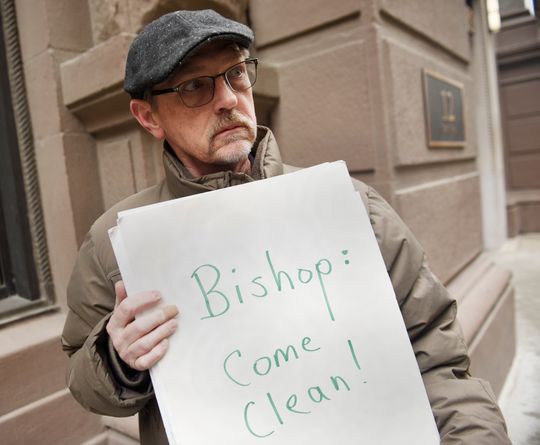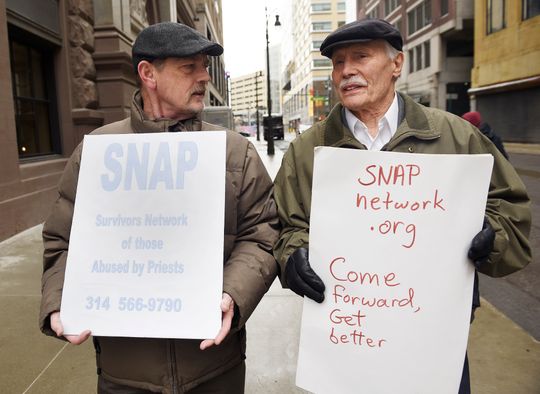Archdiocese of Detroit Will Re-examine List of Accused Clergy
By Sarah Rahal
The Archdiocese of Detroit said Wednesday that it will re-examine its list of religious order priests accused of abuse that some victims allege is incomplete. The announcement came after members of a support group called SNAP (Survivors Network of those Abused by Priests) claimed city's Catholic officials are being "reckless and secretive" by withholding details of all accused priests. "As a result of these concerns, the archdiocese will carefully re-examine each name on our current list as well as the source information provided by the religious orders. If we discover any oversight on our part, it will be corrected immediately," the diocese said in a statement to The Detroit News. SNAP members shared a list of 28 publicly accused clerics with allegations of child molestation who are or were in Detroit area but are not on the Detroit's archdiocese's list of credibly accused clerics. David Clohessy, the former St. Louis, Missouri-based national director and spokesman for SNAP, said the diocese exclusion of some clerics on its list is not an "oversight." "Lists are all virtually all incomplete with split hairs, and (the church) will make excuses as to why certain ones aren't on their list," said Clohessy, 62. "Most of those accused are dead now and probably none are in the parish, but we can't be sure. The ones who are alive aren't on the sex offender registry, and it's essential to acknowledge them because the archbishop isn't giving proper oversight." Allan Kosack from Royal Oak said he was abused by a faculty member of Sacred Heart while he was a 16-year-old seminarian studying for priesthood. "Don't believe appearance, look for evidence," said Kosack, 88, who said the abuse happened between 1947-52. "The church isn't what it appears to be." Sexual abuse cases in the Archdiocese of Detroit have been reviewed independently since 2002 when church officials signed agreements with all six county prosecutors within the diocese. "The Detroit archdiocese welcomes any assistance and updates from members of the community in our efforts to keep our information updated and accurate," the diocese said. The Archdiocese of Detroit said it works to prevent and respond to sexual abuse of minors and vulnerable adults, and "to those harmed by the actions and inaction of Church leaders: It is inexcusable, and we are sorry." The diocese created an online portal at protect.aod.org welcoming victims to report abuse, receive support, view a list of publicly accused clergy members and view statements from Archbishop Allen Vigneron. The portal was created while Vigneron and other Michigan church leaders pushed for more transparency at a bishops conference in November. The conference looked for solutions as Michigan's seven dioceses were served search warrants by then-Attorney General Bill Schuette’s office in October. The Archdiocese of Detroit followed the lead of the Diocese of Gaylord and the Diocese of Saginaw who published lists of dozens of priests who had been credibly accused and many of whom were dead. Clohessy said Michigan needs to continue expanding its statute of limitations. "Litigation brings these cases to light and causes change, but nationally, Michigan is in the top four states with the fewest amount of cases that make it to court," said Clohessy, referencing a 2015 nonprofit study published on Statute of Limitation Reform that ranked the four worst as: Alabama, Michigan, Mississippi and New York.
"When the law prevents you from going to court, all you can do is report it to the church whose intention isn't to bring these cases to light." Last year, Michigan approved new laws to give childhood victims up to 15 years after an incident or until their 28th birthday to pursue criminal charges against their assaulter, up from 10 years or their 21st birthday. Meanwhile, Gov. Gretchen Whitmer has asked the Legislature to approve a $2 million supplemental allocation for a state investigation into clergy sexual abuse within the Catholic Church. The $2 million is expected to pay for the entirety of the investigation and would be funded by state settlement money, said Kelly Rossman-McKinney, a spokeswoman for Attorney General Dana Nessel. Expected to take about two years to complete, the investigation into Michigan’s seven dioceses and their handling of sexual abuse complaints started in August shortly after a grand jury investigation in Pennsylvania found hundreds of abuser priests had molested more than 1,000 children since the 1940s. Michigan's investigation will examine cases and any efforts to cover up complaints dating back to the 1950s. “I acknowledge, too, how disheartening it is for us once again to come face-to-face with moral failures in the priesthood, especially among us bishops," Vigneron said on the archdiocese website. "I realize how discouraging it is that we have not decisively overcome these sins after all these years. These sins are marks of shame upon the Church and a great weight impeding the progress we strive so zealously to make in advancing the Lord’s Kingdom." Contact: srahal@detroitnews.com
|
.
Any original material on these pages is copyright © BishopAccountability.org 2004. Reproduce freely with attribution.

